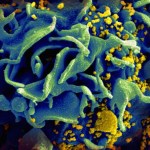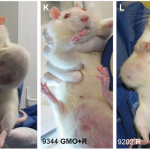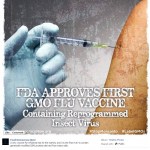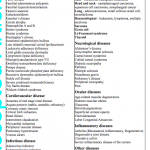GMO
Scientists use a 'gene gun' to insert a gene from a flowering plant called rockcress into the cells of wheat seeds. The genetically modified wheat became more resistant to a fungus called take-all, which in real life can cause "a 40-60% reduction in wheat yields."
T-cells from six HIV+ patients were removed from their bodies, treated with a zinc-finger nuclease designed to snip a gene out of the cell's DNA, and put back in the patients. Removal of the gene mimics a naturally occurring mutation which confers resistance to the HIV virus. But only 25% of the treated cells showed…
You all might have heard about 'delta32' or 'delta-CCR5' people in association with HIV infection.
People who naturally, by chance, have deletions and mutations in the CCR5 gene of their DNA dont make functional CCR5 proteins. It doesnt appear to be 'a big deal', and people who have this particular mutation seem to live normal lives. But the absence of the CCR5 protein means that in these people, HIV does not have one of its favorite co-receptors (note: there are others! CCR5 is just HIVs favorite!). Thus people with this phenotype are resistant to HIV infection.
That is SUPER for them... but…
Not too long ago, when the media became excited about a study saying genetically modified corn causes tumor growth in rats, ScienceBloggers were quick to point out that the study featured some of the worst science ever. Now the paper has been officially retracted by its publisher, but to what end? On Pharyngula, PZ Myers speculates that the study authors avoided statistical analysis of their small, cancer-prone rat packs precisely because there was no statistically significant effect of being force-fed GMO corn. PZ also says "journalists who got the paper in advance had to…
WHOO!
FREE book on GMOs, written by actual scientists and farmers, compiled by a former anti-GMOer who is now convinced of GMOs utility:
The Lowdown on GMOs: According to Science
I found out about this book from two of my friends, Karl Haro von Mogel and Anastasia Bodnar. These two were part of founding Biofortified (The Pandas Thumb of plant genetics) and are actual scientists (not just random people on the internet with an opinion).
But you can learn more about the other authors from David Tribe (another actual scientist and contributor to the book).…
Well, Thanksgiving's over, and the orgy of consumerism known as Black Friday is in full swing. Personally, I have to work, at least part of the day, and I don't go anywhere near the stores on Black Friday anyway. I haven't for years. So we might as well briefly discuss a bit of science today. It won't be long (by Orac standards), but there was a tidbit of news that hit the blogosphere on Thanksgiving Day that caught my interest. Apparently the execrable study by Gilles Séralini on the effect of using feed made from genetically modified organisms (GMOs) on rats is heading for retraction. You…
Petition | Global scientific community condemns the recent destruction of field trials of Golden Rice in the Philippines | Change.org.
Can you be skeptical about GM but believe in climate change? So asks Alice Bell in The Guardian. The answer is of course, "Yes," but you can also be a fundamentalist Christian while believing in evolution and being a great scientist, so being able to hold two things in your brain at the same time is not a useful measure of logical incompatibility. One can be right about one thing and wrong about the other.
But let's get to the real issue raised in Bell's piece, the use of the term "anti-science" to describe opponents of genetically modified organisms (GMOs):
When people use the…
I never used to write much about genetically modified organisms (GMOs) before. I still don't do it that often. For whatever reason, it just hasn't been on my radar very much. That seems to be changing, however. It's not because I went seeking this issue out (although I must admit that I first became interested in genetic engineering when I was in junior high and read a TIME Magazine cover article about it back in the 1970s), but rather because in my reading I keep seeing it more and more in the context of anti-GMO activists using bad science and bad reasoning to justify a campaign to demonize…
Why do food writers think they are competent to evaluate the scientific literature? I know of at least two who, based on their tweets, clearly are not. One is Mark Bittman, who we have previously chastised, and now also Michael Pollan who has been a bit more coy about promoting anti-science related to GMO. Now they've both been broadcasting the flimsy results of this paper - A long-term toxicology study on pigs fed a combined genetically modified (GM) soy and GM maize diet - published in the "Journal of Organic Systems". Why do I feel like I'm reading headlines from Climate Depot or…
On Thursday, I had a post published on Scientific American's guest Blog about claims that genetically modified food crops could contain allergens. In it, I am critical of the Union of Concerned Scientists (a science advocacy and policy organization), for what I read as misplaced opposition to genetic engineering:
The UCS’s concern about the dire state of our food system is well-founded, and I applaud their efforts to get out in front of the policy debate. There’s just one problem: they oppose using all of our technology to help combat this problem. Specifically, I’m talking about…
Ok, this is a little different, but it's annoying, so I'm going to talk about it.
Let me begin by saying I love the Union of Concerned Scientists. They've been wonderful advocates on climate change for decades; they are media savvy, they train scientists to be media savvy, and they push the media and policy makers alike to understand the scientific consensus. When it comes to climate change, I trust them over just about any other source.
Which is why it's so disappointing that they are so wrong on genetically modified organisms.
Several years ago, UCS decided to branch out…
It's a sad day for the reality-based community, within the critiques of Jane Goodall's new book 'Seeds of Hope' we find that in addition to plagiarism and sloppiness with facts, she's fallen for anti-GMO crank Jeffrey Smith's nonsense.
When asked by The Guardian whom she most despised, Goodall responded, “The agricultural company Monsanto, because I know too much about GM organisms and crops.” She might know too much, but what if what she knows is completely wrong?
Many of the claims in Seeds of Hope can also be found in Genetic Roulette: The Documented Health Risks of Genetically Engineered…
Another day, another disease treatment strategy based off a genetically modified virus!
Prostate Specific Antigen Retargeted Recombinant Newcastle Disease Virus for Prostate Cancer Virotherapy.
This one is so clever, you guys. It is so freaking clever!
Some of you might know that sometimes, when prostate cancer is present, there is an elevated level of 'Prostate Specific Antigen'. Physicians used to test for elevated PSA levels as a test for prostate cancer, but because it lead to over-diagnosis/unnecessary treatments, its not anymore.
But lets say you *know* prostate cancer is there, and it…
Mark Lynas » Golden promise: How ‘biofortification’ could soon be saving hundreds of thousands of lives.
Monsanto court case not about save-the-seeds myth - Winnipeg Free Press.
Finally, after a 12-year delay caused by opponents of genetically modified foods, so-called “golden rice” with vitamin A will be grown in the Philippines. Bu for 8 million kids, the wait was too long.
GM food: Golden rice will save millions of people from vitamin A deficiency. - Slate Magazine.
This is ridiculous. After all of the papers I have read, written about, the new stuff we can do with GMO viruses...I can still be amazed. This is insane:
Randomized dose-finding clinical trial of oncolytic immunotherapeutic vaccinia JX-594 in liver cancer
The patients in this study had liver cancer. Specifically, malignant hepatocellular carcinoma (HCC). In general, someone diagnosed with HCC can expect to live 3-6 months.
These patients had already failed conventional therapies, so they were looking at 2-4 months.
So they tried the best kind of alternative therapy-- Not witch…
Respected writer Jared Diamond recently published an overall excellent opinion piece in the New York Times discussing how we often obsess about the wrong things, while failing to watch for real dangers.
Jared Diamond’s Guide to Reducing Life’s Risks - NYTimes.com.
Many of us in the Plant biology community were quite surprised at one phrase buried in an otherwise excellent article:
'It turns out that we exaggerate the risks of events that are beyond our control, that cause many deaths at once or that kill in spectacular ways — crazy gunmen, terrorists, plane crashes…
I wish I wish I wish this article was open access! ARG!!
Gene therapy clinical trials worldwide to 2012 - an update
This article is a great review of gene therapy as a therapy, and how it has evolved from an experiment that killed children to an accepted therapy that is saving and improving lives.
Here is a list of all the diseases that have been/are/will be treated with gene therapy:
http://www.ncbi.nlm.nih.gov/pubmed/23355455
These are trials in humans-- this list doesnt include all of the therapies that are still in the tissue culture/animal model segments of the pipeline. Can…
Crazy random happenstance considering the post earlier this week on 'religious' vegans refusing the influenza vaccine in hospitals:
Flublok, a Flu Vaccine, Wins F.D.A. Approval
The vaccine, developed by a small company called Protein Sciences, is made with a process that does not require the virus to be grown in chicken eggs, as is now generally done.
I had no idea this was in the works-- No insider info, just great news, for vegans, people with egg allergies, and YOU!
Some folks figured out a way to make The Flu Vaccine (a mix of three different influenza variants) in an insect cell line.…





